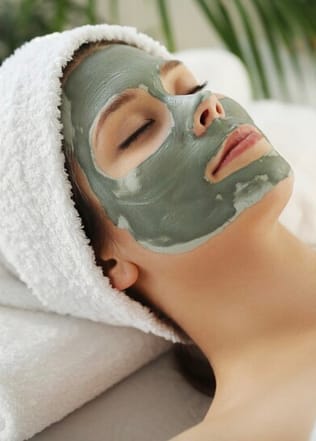The Ultimate Guide to Natural Face Masks is a comprehensive resource covering skin types, DIY recipes, and ready-made products with vegan and organic ingredients for healthier, radiant skin.
I. Introduction
Welcome to the "The Ultimate Guide to Natural Face Masks." In a world where skin care is synonymous with health. Discover the transformative power of natural face masks.
Dive into the benefits of these green beauty treasures, crafted with a focus on vegan and organic ingredients, and unlock the secret to radiant, wholesome skin. Your journey to healthier, more beautiful skin begins here.
II. Types of Natural Face Masks
When it comes to natural face masks, you have options at your fingertips.
A. Let's explore some of the most popular types
1. Clay Masks
Known for deep cleansing and unclogging pores. They absorb excess oil and impurities, leaving skin refreshed and revitalized.
2. Fruit Masks
Packed with vitamins and antioxidants, these masks brighten skin, promote an even tone, and provide a natural glow.
3. Herbal Masks
Infused with botanical goodness, herbal masks soothe and hydrate the skin, making them perfect for sensitive or dry skin types.
4. Sheet Masks
Convenient and drenched in beneficial serums, they offer a quick moisture boost, helping to nourish and rejuvenate your skin.
5. Exfoliating Masks
These masks remove dead skin cells, improving texture and allowing better absorption of skincare products.
6. Hydrating Masks
Ideal for parched skin, they provide an intense moisture surge, leaving your skin plump, smooth, and well-hydrated.
7. Charcoal Masks
Charcoal masks are excellent at drawing out impurities and toxins, leaving your skin cleansed and refreshed.
Each type of mask has unique benefits, allowing you to tailor your skincare routine to your specific needs and preferences. Whether you're looking for detoxification, hydration, or rejuvenation, there's a natural face mask to match your skin's desires.
III. Understanding Your Skin
A. Different Skin Types
1. Normal Skin
- Balanced moisture levels
- Minimal sensitivity
- Small pores
2. Oily Skin
- Excess sebum production
- Prone to acne and blackheads
- Larger pores
3. Dry Skin
- Insufficient sebum production
- Flakiness and tightness
- Fine pores
4. Combination Skin
- Combination of dry and oily areas
- Tailored care for different zones
B. Identifying Specific Skin Concerns
1. Acne and Blemishes
- Causes and factors contributing to breakouts
- Identifying acne-prone areas
2. Fine Lines and Wrinkles
- Understanding aging effects on the skin
- Targeting specific areas with concerns
3. Hyperpigmentation
- Causes of uneven skin tone
- Addressing dark spots and discoloration
4. Sensitivity and Redness
- Triggers for sensitive skin reactions
- Soothing irritated areas
C. How Natural Face Masks Cater to Various Skin Needs
1. Balancing Act for Oily Skin
- Ingredients to control sebum production
- Mattifying and clarifying properties
2. Hydration Boost for Dry Skin
- Moisture-retaining components
- Nourishing and replenishing effects
3. Gentle Solutions for Sensitive Skin
- Calming and anti-inflammatory ingredients
- Hypoallergenic mask options
4. Anti-Aging Formulas for Mature Skin
- Ingredients with collagen-boosting properties
- Targeting fine lines and wrinkles
By going into the specifics of each skin type and concern, this section will empower you to choose natural face masks tailored to your unique needs, fostering a more personalized and effective skincare routine.

IV. DIY Natural Face Mask Recipes
A. Easy-to-make DIY face mask recipes, along with step-by-step instructions and ingredient lists for each
1. Hydrating Avocado and Honey Face Mask
Ingredients:
- 1/2 ripe avocado
- 2 tablespoons of honey
Instructions:
- Mash the ripe avocado in a bowl until it's smooth.
- Add honey to the mashed avocado and mix well until you have a consistent paste.
- Apply the mixture to your clean face, avoiding the eye area.
- Leave it on for 15-20 minutes.
- Rinse with lukewarm water and pat your skin dry.
2. Brightening Turmeric and Yogurt Face Mask
Ingredients:
- 1 teaspoon of turmeric powder
- 2 tablespoons of plain yogurt
Instructions:
- Mix the turmeric powder and yogurt in a bowl to create a paste.
- Apply the paste to your face, avoiding the eyes.
- Allow it to sit for 10-15 minutes.
- Gently rinse off with cool water and pat your skin dry.
3. Exfoliating Oatmeal and Honey Face Mask
Ingredients:
- 1/4 cup of oats
- 2 tablespoons of honey
Instructions:
- Grind the oats into a fine powder using a blender or food processor.
- Combine the oatmeal and honey to make a thick paste.
- Apply the mixture to your face, avoiding the eyes.
- Gently massage the mask onto your skin in a circular motion.
- Leave it on for 15-20 minutes.
- Rinse with warm water, then pat your skin dry.
These DIY face masks are simple to make with readily available ingredients and offer various skincare benefits. Always perform a patch test to ensure no allergies or sensitivities to the ingredients before applying them to your face. Enjoy pampering your skin with these natural treats!
V. Benefits of Using Natural Face Masks
Natural face masks are a key to achieving and maintaining healthy skin.
A. Here's how they promote skin health and the importance of their absence of harmful chemicals
1. Nourishment with Natural Ingredients
Natural face masks are crafted from ingredients found in nature, such as aloe vera, honey, and herbal extracts. These ingredients are rich in vitamins, antioxidants, and minerals that nourish and rejuvenate the skin.
2. Hydration and Moisture
Many natural ingredients, like aloe vera and coconut oil, are excellent at retaining moisture. They help keep the skin well-hydrated, preventing dryness and promoting a soft, supple complexion.
3. Gentle and Non-Irritating
Natural face masks are gentle on the skin, making them suitable for sensitive or easily irritated skin types. They lack harsh chemicals that can cause redness or allergic reactions.
4. Anti-Inflammatory Properties
Ingredients like turmeric and green tea have natural anti-inflammatory properties, which can help reduce redness, puffiness, and the appearance of acne.
5. Safe and Chemical-Free
One of the most significant advantages of natural face masks is their absence of harmful chemicals, such as parabens, sulfates, and synthetic fragrances. These chemicals can be harsh on the skin and potentially harmful over time.
6. Improved Complexion
Natural face masks can promote a more even skin tone, reduce blemishes, and enhance your skin's overall appearance.
By opting for natural face masks, you're choosing a holistic approach to skincare that focuses on the well-being of your skin without exposing it to harmful chemicals. They enhance your skin's natural beauty and contribute to its long-term health and vitality.
VI. The Ultimate Guide to Natural Face Masks
Tips for applying face masks effectively and a few precautions to keep in mind
A. Effective Application Tips
1. Cleanse First
Start with a clean face. Use a gentle cleanser to remove dirt and makeup. It ensures that your skin is free of impurities.
2. Patch Test
If you're using a new face mask or ingredients, perform a patch test on a small area of your skin to check for allergies or sensitivities.
3. Even Application
Apply the mask evenly to your face, avoiding the delicate eye and lip areas. Use a clean brush, spatula, or your fingers, depending on the mask type.
4. Relax
Find a comfortable, quiet place to relax while your mask works its magic. Lie down or sit back, and enjoy some downtime.
5. Follow the Instructions
Always follow the recommended time for leaving the mask on. Leaving it on too long can sometimes have adverse effects, while not leaving it long enough may not yield the desired results.
6. Rinse Thoroughly
Use lukewarm water to gently rinse off the mask. Avoid hot water, as it can be harsh on the skin.
7. Pat Dry
After rinsing, pat your face dry with a clean, soft towel. Avoid rubbing, as this can irritate the skin.
B. Precautions and Considerations
1. Allergies
Be aware of any allergies to the ingredients in the mask. If you have allergies or sensitive skin, choose masks accordingly.
2. Frequency
Follow the recommended usage frequency for the specific mask. Using a mask too often can lead to over-exfoliation or irritation.
3. Sun Protection
After using certain masks, like exfoliating ones, your skin may be more sensitive to the sun. Apply sunscreen (read my blog post about natural sunscreen) to protect your skin.
4. Consult a Professional
If you have specific skin concerns or conditions, consider consulting a dermatologist for personalized advice.
5. DIY Caution
When making DIY masks, ensure that your ingredients are fresh, and avoid using any that may have expired.
Remember that consistency is key to seeing the best results with face masks. Incorporate them into your skincare routine as recommended for your specific skin type and needs.

VII. Additional Resources
- Honey and its nutritional and anti-inflammatory value (2021) https://www.ncbi.nlm.nih.gov/pmc/articles/PMC7807510/
- Empty nano and micro‐structured lipid carriers of virgin coconut oil for skin moisturisation (2016) https://www.ncbi.nlm.nih.gov/pmc/articles/PMC8676212/
- Application of Blue Honeysuckle Powder Obtained by an Innovative Method of Low-Temperature Drying in Skincare Face Masks (2021) https://www.ncbi.nlm.nih.gov/pmc/articles/PMC8658987/
VIII. Conclusion
We've unveiled The Ultimate Guide to Natural Face Masks, your passport to healthier, more radiant skin. With a wealth of benefits, including nourishment, hydration, and gentle care, these masks stand as a testament to the wonders of nature.
The absence of harmful chemicals ensures your skin's well-being, making them a choice you can trust. I encourage you to take the knowledge you've gained here and incorporate natural face masks into your daily skincare routine.
Whether you seek rejuvenation, soothing, or a luminous complexion, there's a natural mask waiting to meet your skin's desires. Embrace the power of nature and experience the transformative effects firsthand. Your skin will thank you for it.
IX. My Experience
Exploring The Ultimate Guide to Natural Face Masks has been a delightful journey. What makes it even special is that it's not just a solo endeavor; it's an experience I've shared with friends and family.
Bonding over a face mask routine has become a cherished tradition, allowing us to unwind, connect, and rejuvenate together. The beauty of these natural face masks goes beyond their skincare benefits.
They keep our faces clean and beautiful, undoubtedly. But what I treasure equally is the sense of relaxation that envelops us while we indulge in this self-care ritual. The soothing textures, the fragrant scents, and the simple act of caring for our skin combine to create a moment of tranquility amidst our busy lives.
Whether it's a girls' night in with vibrant fruit masks or a calming herbal mask session with family, the shared experience brings us closer. It's a reminder that self-care is not just about physical beauty; it's also about nurturing our bonds with the people we love.
So, don't hesitate to invite your loved ones to join you on this journey – it's not just about masks; it's about making beautiful memories together. You should check out my blog posts about skin scrubbing, natural skincare, and natural skin detox methods.
Thank you for reading my guide on natural face masks!
I'd love to hear from you. Please share your thoughts, experiences, and any questions you have in the contact form below. And don't forget to explore our other insightful blog posts for more skincare secrets and tips!

 Simple. Natural. Better.
Simple. Natural. Better.